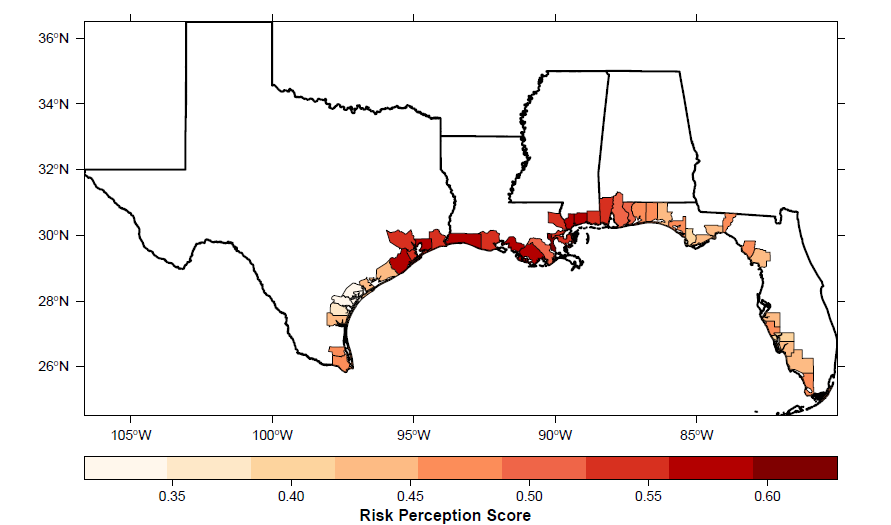|
Our new paper on aggregate perceptions of hurricane risks has been published on the Annals of American Association of Geographers.
1 Comment
In a study that has been accepted by the Annals of the American Association of Geographers, my coauthors and I have examined how community resilience along with objective hurricane risks impacts aggregate perceptions of hurricane risks. We first applied spatial techniques to transform individual-level perceptions to the aggregate level, in this case, counties. The map below displays the geographic pattern of hurricane risk perceptions among coastal counties along the U.S. Gulf Coast. Clearly, there is a concentration of heightened hurricane risk perceptions stretching from southeast Texas to west Florida. Given the recent enormous impact of Hurricane Harvey in southeast Texas and West Louisiana, it is likely that risk perception has further increased among coastal residents who have been affected by Harvey. Further, we found two aspects of community resilience measured by Cutter et al. (2014), namely economic resilience and community capital, are positively related to aggregate perceptions of hurricanes risks. This indicates that communities with more economic resources and social capital tend to perceive greater threat of hurricanes. The policy implication is that counties with less economic and social capitals need to direct efforts on educating the public about scientific assessments of hurricanes risks. Reference:
Cutter, S. L., Ash, K. D. and Emrich, C. T. 2014. The geographies of community disaster resilience. Global Environmental Change, 29, 65-77. Shao, W, Gardezi, M., and Xian, S. (forthcoming). Examining the effects of objective hurricane risks and community resilience on risk perceptions of hurricanes at the county level in the U.S. Gulf Coast: An innovative approach" Annals of the American Association of Geographers. The obesity rate has been rising rapidly in America over the past two decades. Many factors have been identified as contributors to this ongoing public health crisis. The food industry plays a powerful role shaping public perceptions of food and eating behaviors, as this Vox article explains.
As a geographer, I am always concerned with the influence of our surrounding environment on what we perceive and how we behave. In this paper, my coauthors and I have considered the impacts of built and natural environments on physical inactivity and correspondingly obesity rate. We have made a couple of findings. First, higher street connectivity and walk scores are related to lower physical inactivity and obesity rates. In a more pedestrian-friendly environment with more streets and connections, people tend to be more physically active and less likely to be obese. Second, higher ratio of fast-food restaurants in a community is positively related to physical inactivity and obesity. Surprise, surprise, fast-food makes people become more obese, well, because in the fast-paced modernity, fast-food is literally fast and therefore convenient for people to grab and eat on the go. Last but not least, the number of extreme weather events is also found to lead to physical inactivity and obesity. When extreme weather events occur, the environment outside the window all of a sudden becomes hostile. People are constrained inside, much less likely to get engaged in any exercises. So, these extreme weather events pose threats to not only public safety but also public health. 5/8/2017 0 Comments Globalism vs. Nationalism France just elected the youngest person ever to rule that republic. This French presidential election has historical meaning. Since "Brexit" and the 2016 US presidential election, the western world has been at the crossroad, with "globalists" who advocate globalization via free trade and open border and "nationalists" who resist globalization constantly being involved in the tug of war. Anti-globalization sentiment handed nationalists two substantial victories in 2016. Nationalism seemed to be on a path to erode the western democracy by riding a wave of popularity. Now, the French presidential election put the temporary brakes on this movement.
Globalists may feel a sense of relief now, but this tug of war is not going away any time soon. As a matter of fact, a war over Paris Accord between these two factions is unfolding in the White House. |
|



 RSS Feed
RSS Feed